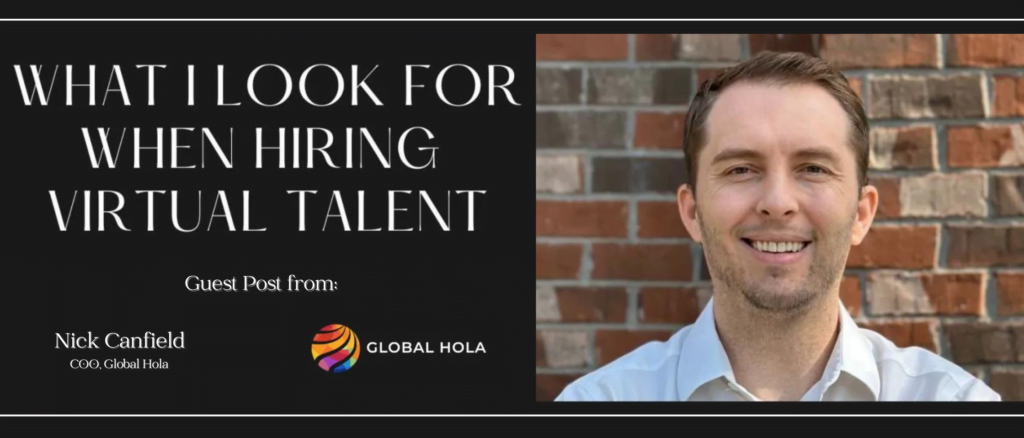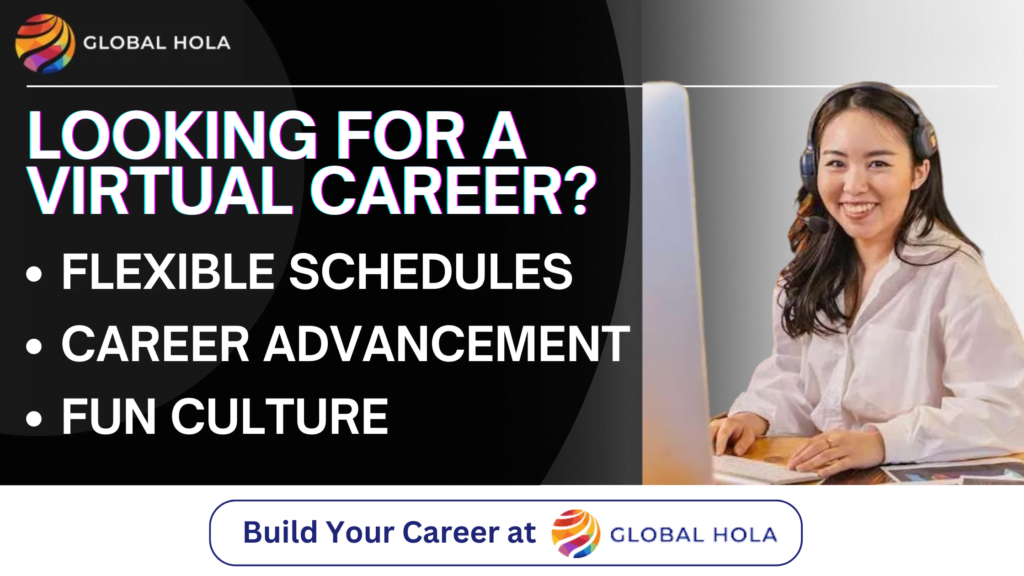This article is a guest post from Nick Canfield, COO of virtual staffing company Global Hola. Here, Nick shares his insights on what employers are looking for when hiring remote talent from the Philippines.
Within the first 5-10 minutes of an interview, hiring decisions are often already taking shape. Surprised? Let me share some insider secrets.
How is this done? I know what to look for when hiring virtual talents: clear communication, technical skills, and an “it” factor. But what do these things boil down to? With a lot of experience interviewing numerous virtual talents from the Philippines and other countries, I’ve honed the ability to spot standout candidates quickly during interviews.
At Global Hola, we have to find and compete for the best talents, and to help you better as a potential candidate for virtual job interviews, I want to give you some tips and tricks about what hiring managers look for when we’re interviewing you.
Let’s go behind the curtain. Here I’m going to share with you the top 10 things I look for that make candidates stand out from the rest during interviews.

Table of Contents
About Nick Canfield, COO at Global Hola - Expert in Business Automation
As the Chief Operating Officer at Global Hola, Nick partners with businesses across the US and Europe, unveiling the potential of the Philippines’ virtual talents. A passionate digital nomad, Nick splits his time between the Philippines, Vietnam, and Thailand. Beginning his journey as a Peace Corps Volunteer, he later pursued higher education by achieving a master’s degree in Political Science. Driven by a vision of global opportunity and connectivity, Nick is dedicated to bridging talented professionals with unparalleled job opportunities worldwide.
What I Look For When Hiring Virtual Talents
1. Punctuality
This is the first thing that you demonstrate after applying and booking your interview. If you’re scheduled for an interview at 10 a.m., be ready and waiting in the meeting room by 9:50 a.m. It’s more than just a good habit; it’s a testament to your commitment and respect for your interviewer’s time.
It’s okay to be a couple of minutes late, but you better have a good reason and communicate it well. If you’re running into tech problems, email us before the meeting time or during the first minute. Making me wait until 4-5 minutes post-start time with no communication on your end will definitely ruin your chances with us, guaranteed.
2. Clear and Concise Communication
Clear communication is the #1 skill I look for when hiring, just as much as having a technical match with the role. When answering questions during the interview, be precise and clear. Only use jargon if the interviewer seems like a jargon person with knowledge of your industry. Keep it short, simple, and interesting.
Don’t bore me with the whole story of how you started your online working journey for 10 minutes. Give me the highlights and parts that connect with the role you’re applying for. Avoid going off on tangents and provide supplementary information only if asked.
My recommendation is for you to practice telling your work history stories with your friends or colleagues to be no more than 30-45 seconds. Try to get your work history down to 30 seconds, and allow me to ask questions more about what you’ve said. No one likes a babbler, so don’t be one😉.
3. Honesty – No BS
There’s no harm in admitting you don’t know something. In fact, it’s refreshing compared with how many times people will BS. It shows integrity and a willingness to learn. Remember, no one has all the answers, but it’s your approach to uncertainties that speaks volumes.
Practice your answers to questions you don’t know. You can say things like “That’s a good question, and to give a good answer, let me send you a follow-up after our interview. Is that okay?” <– Very refreshing, and I’ll probably say “Yes, of course.”
Many times your interviewer will have no idea about the details and technical parts of a role they’re interviewing you about, but when they do and you make up a fact instead of saying the “let me get back to you” line, it’s a huge disqualifier.
Be honest. Be open. Don’t “fake it til you make it”.
4. Warmth and Friendliness
Smiles go a long way as do fun greetings at the beginning of a chat. These simple things set the tone for the rest of the interview, and they also reflect the kind of working relationship you’re likely to foster. I’m not advising you to be ‘overly-smiley’, but come into the interview in a good mood so that smiling won’t come off as inauthentic.
5. Camera Etiquette
Keeping your camera on during interviews is essential: 100%. If a talent won’t turn on the camera, the interview is essentially dead.
Also, make sure you’re in a well-lit room that is away from noises or other distractions. Get that lighting right! If the lighting makes you look weird or even “evil” (light coming from below or too much to the side), then it’s going to color my judgment.
Invest in some good lighting in your interview room. It can be a great indicator that you care about your work setup, and it shows that you know how to present yourself well.
6. Adaptability
I love throwing difficult questions at candidates such as on-the-job questions. These give talents a way to show their technical skills while demonstrating how they communicate well or not well. Candidates who demonstrate flexibility and adaptability, and can handle unexpected changes or challenges, often shine brighter than others.
My recommendation is for you to think of a story when you had to adapt to a new work situation, and then practice telling that story with a friend. Always set your story up for a classic story format of scene setup, problem, what you did, and the impact/outcomes.
7. Technical Proficiency – Knowing a bit about a lot in your field
While this might seem like a given, it’s worth emphasizing given that many people apply for jobs they’re not qualified for. If you do that, you probably won’t get an interview. However, if you do slip through and find yourself in an interview without having a broad understanding of the field you’re in, you’re toast.
No interviewer expects you to have experience in every tool in your field, but you need to know the general and most common tools in the field that you’re working in.
For example, if you’re being hired as an SEO specialist and you have never created a blog post in WordPress, I’m going to really question your experience. If you’ve been an email marketing specialist and you don’t know what MailMerge is or what a good conversion rate is for an email campaign, I’m really going to question you. If you’ve been a virtual assistant and you don’t know how to use the basic features of Excel, how can I be confident backing your experience for a client?
Most importantly, if you haven’t actually used the tools that your interviewer asks about, you should demonstrate you have learned a similar tool and know the features. Employers usually place these tools in their job descriptions, so go research them before the interview! Know your stuff coming into the interview, and be prepared for technical questions. Prep for them. If you answer those correctly and are concise with your answers, you’ll probably get hired!
8. Being Proactive
Candidates who show a proactive approach by asking pertinent questions about the role, company culture, and other aspects make a lasting impression on me. Demonstrate that you really have reviewed the company and job description by talking about specific points from the employee handbook or through a technical question about responsibilities in the job description. Have these documents open when we’re interviewing. Share your screen and show that you’ve been taking notes during the interview. All of these things showcase not only your interest in the role but also that you know how to be an effective online worker. <– Super big bonus points earned here.
9. Cultural Sensitivity
Working for an international company like Global Hola means you’ll be interacting with clients and colleagues from diverse backgrounds. Respecting and understanding different cultures is not just a bonus; it’s a necessity. We love talents who have worked with people from various countries including those in the US, Canada, and Europe. Additionally, talents who have experience working with Asian-based countries like those in Japan, Korea, and Singapore also are appealing.
If you’re interviewing with an American company, find out in what city they’re located. Share an interesting fact that you learned about their HQ city. Talk about some of the cultural differences you’ve experienced working with clients overseas and how you worked through these differences.
In all, show that you’re cognizant of your own local culture while showing you’re adaptability and sensitivity to work with those different than you.
10. A Learning Mindset
Candidates who express an eagerness to learn new tools, technologies, or methodologies always stand out. Continuous learning is a key component of success in any role. But it’s not just future learning. It’s your past.
Those who have a demonstrated record of learning new skills from online courses like Udemy and Grow with Google really show me that they love learning and can gain new skills quickly.
FINAL NOTE
If you’re gearing up for an interview at Global Hola or any other outsourcing agency, keep these points in mind. It’s not just about ticking technical boxes. You need to be clear, concise, and knowledgeable, and you need to demonstrate that you’re fast on your feet and willing to learn. If you’ve got those things, you’re likely hired!
Remember, in every interview, you’re not just a candidate – you’re a storyteller. Craft your narrative, showcase your strengths, and let your unique journey shine through.




